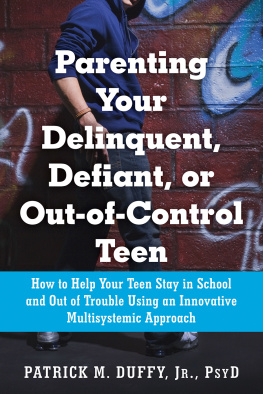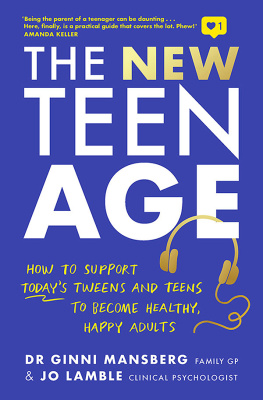Acknowledgments
Anyone who has ever written a book knows that its always more than a one-person task. There are the numerous people who challenge, support, cajole, tease, and cheer you along the way, and who, because of their input, transform the book into something more than one persons work. This is most assuredly the case with this book. And because of their connections to this project, there are a few people I want to thank and acknowledge publicly.
First, thanks to my home team: Megan, Lucia, and Sam. Youre the best. Lets always keep our connections to one another first and foremost. Thanks also to my colleague and best buddy, Joe Di Priscoyour questions and musings linger longer than you know.
Thanks to my esteemed literary agent and friend, Liz Trupin-Pulli. Your support and advice is of the highest value.
Thanks to my editor, Marnie Cochran, and my publisher, David Goehring of Perseus Publishing, for your instant and unwavering enthusiasm for this project, from start to finish. Thanks especially to you Marnie, and not just for your superior editing skills but also as much for your heartfelt feedback throughout the writing.
I also want to acknowledge Marianne Jacobbi and the folks at The Ceridian Corporation who several years ago asked me to make a recorded talk for them on talking with your teenager. That was when I first began to focus on the idea of a book based on the connection between teenagers and their parents.
And a special thanks to the crew at MARs Architecture for putting up with a moody writer in their midst.
Finally, to all the parents and teenagers who have shared their stories with me. In the end you are the impetus for this book. Listening to your stories and recognizing the savvy understanding of the deep issues at play during adolescence has been inspiring. I just hope I have done you all justice.
Introduction
I respect teenagers a great deal, and I respect the parents of teenagers even more. Nothing in a parents life is more trying, confusing, and frustrating than raising a teenager. They are moody, self-centered, and full of mixed messages; at least thats the way normal, healthy teenagers behave. That will not change. As the parent of a teenager, you know all too well that your job entails setting limits, having big talks, enforcing consequences, helping them to learn from their mistakes, and putting them on course for a happy and successful adulthood. Talk about an exhausting task.
What I find curious, however, is that hardly anyone ever mentions the importance of staying connected to our teenagers throughout their adolescence. Given the enormous To Do List from the previous paragraph, why isnt anybody addressing practical ways of staying connected to our teenagers throughout this trying time? From a practical perspective, all the items on your To Do List are handled more efficiently, more effectively, and more pleasantly when you are connected to your teenager. For instance, research has shown that the emotional connection between adolescent girls and their parents (especially their mothers) significantly delays the onset of sexual activity. When you are connected, everything else comes more easily and naturally. And when they do misbehaveas they willnothing worthwhile can happen until your connection is reestablished. The number one complaint of the parents of teenagers is a lack of communication with their teenagers, but even in the face of this, if you are paying attention, thinking creatively, and maintaining your curiosity, your connection will hold steadfast despite the lack of regular heart-to-heart talks.
Beyond effectiveness, there is another reason to maintain your connection with your teenager: Its fun. Teenagers, for better and worse, are some of the most creative and fun people on the planet, and when you stay connected you, too, enjoy these aspects of your teenager; and in doing so, you regularly replenish your parenting batteries. Besides, sharing humor itself promotes connection. Or, as the humorist Victor Borge once said, Laughter is the shortest distance between two people.
Therefore, I find it surprising that although there are many good books on the market about setting limits and such, there are none about how to maintain the connection with your teenager despite everything else that is going on and that is demanded of you. This book fills that gap. Staying Connected to Your Teenager deals exclusively with all that you can do to strengthen and deepen your relationship with your teenager even as you attend to the more standard parental duties. Ill leave the rest of the To Do List to the other books.
More than ever before, as your children become teenagers you yearn for a deep connection, and with good reason. First, regardless of the ages of your kids, as a parent you always see the five-year-old in them, and from this frame of reference no five-year-old is ready for puberty and beyond. Second, society appears to have changed for the worse. Even though generations have been saying this since probably before the invention of the written word, it now feels different somehow. The devastation and after effects of the Columbine shootings and the terrorist attacks of September 11, 2001, are still washing over us. Add to that the crisis in the Catholic Church and Wall Street and we see that each event in its own way has forced us to reconsider the previously safe havens of school, work, and church. Third, over time, adolescence has become stretched out. These days, teenagers are dependent on their parents well past the teen years, at least until the end of college for most, and beyond that for many others.








